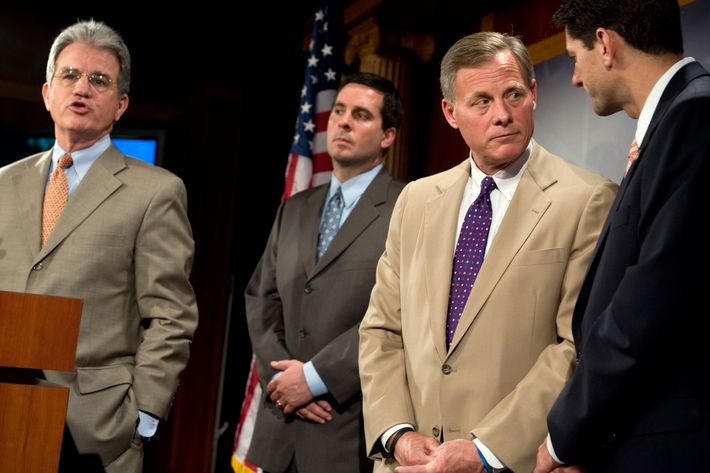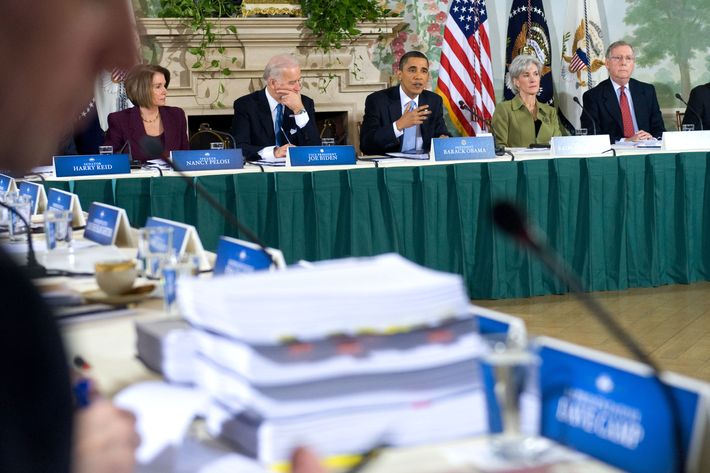
Last week, Republican Senators Tom Coburn, Richard Burr, and Orrin Hatch unveiled a health-care proposal – or, at least, a close approximation of one. Conservatives hailed it as a seminal event, the moment when the Republican Party would finally dispel the accusation of mindless obstructionism and assert its full equal status as a vessel for serious health-care policymaking. Ross Douthat rejoiced, “mirabile dictu, an actual health care reform proposal!” The new plan “explode[s] the myth,” exulted a National Review editorial, that “Obamacare or something like it is the only game in town.”
Republicans are certainly going to have to abandon their indifference to policy and formulate an actual health-care reform policy. But the moment has not arrived, and the events since the plan’s hopeful emergence have made the gap between aspiration and reality painfully clear.
Within hours of the new plan coming into contact with political reality, things began to fall apart. The general outlines of the plan involved deregulating health insurance, so that healthy customers paid less for cheaper plans and sicker customers paid more, and shifting the tax burden off the wealthy and onto the middle class. Defining its effects more specifically has proven difficult. It’s less a plan than an outline that, depending on how the authors filled in its missing details, could mean any number of wildly different things.
The first blow to its coherence came when the authors faced questions about their proposal to cap the tax deduction for employer-sponsored health insurance, a politically risky but economist-approved change that provided most of its money for covering the uninsured. Asked about this piece of their plan, the authors changed the language within hours to ratchet back its scope, insulating them from political attacks, but also neutering its value.
The next thing that happened was that, on Tuesday, the Congressional Budget Office released a new budget update. The latest CBO estimate contained political gold for Republicans: It estimated that the availability of health insurance would spur workers to reduce their labor by the equivalent of two million jobs, a change Republicans could gleefully mischaracterize as “destroying two million jobs.” Of course any health reform plan would reduce employment this way – if you give people the chance to leave the safety of employer-sponsored insurance without risking the horrors of the pre-Obamacare individual market, many of them will. The Republican proposal, sketchy though it was, would likely have approximately the same “job-killing” impact as Obamacare.
But while reveling in the potential new attack line, Republicans suddenly forgot that they had a plan other than repealing Obamacare. What was the fun in comparing Obamacare to a specific plan, with trade-offs and disruptions of if its own, when they could continue assailing every real or imagined downside of Obamacare, full stop?

Every Republican health-care reform plan in history has served the same purpose: to enable Republican politicians to say that they do indeed have a health-care reform plan, in order to block Democrats from enacting a health-care reform plan. Two of the sponsors of the new Republican plan, Coburn and Burr, also sponsored, along with Paul Ryan, a health-care plan in May 2009. It was a pretty good plan, albeit a somewhat vague one. It was based on replicating Mitt Romney’s successful reform in Massachusetts in the other states. It set up health-care exchanges in every state, which would be regulated heavily. The plan, the authors wrote, “prevents cherry picking — when insurance companies choose to cover only healthy patients — by equalizing risk across insurance companies and reversing the perverse incentives that leave those most vulnerable with the fewest options.” It required that all health-insurance plans “meet the same statutory standard used for the health benefits given to Members of Congress.” Ezra Klein really liked it.
That sounds a lot like Obamacare, doesn’t it? Indeed, it does. But Ryan, Coburn and Burr did not see their plan as fertile grounds for compromise. Instead they saw it as the free-market alternative to the European, socialistic horrors Democrats longed to impose upon America. In defending their plan, they pointedly contrasted it with Obamacare’s public option:
Nothing will rally ordinary Americans against the president’s plan more than his allies arguing too forcefully for a system run by politicians and bureaucrats in Washington — what we call the “public option” in the Obama plan …
If Washington can effectively run a health program like Obama’s public option, why are Medicare, Medicaid, and other federal health programs in such disrepair?
One might conclude from the basis of this rhetoric that removing the public plan, leaving the work to be done by private insurers in regulated markets, would bring the sponsors close enough to cut a deal with Obama. But that did not happen. When Obama abandoned the public option to win over moderate Democrats, Republicans simply moved farther and farther away. By February 2010, Obama’s plan was on the ropes, and he held a summit to find common agreement. There Ryan and Coburn denounced ideas they had endorsed the year before. “You’re defining exactly what kind of health insurance people can have; you’re mandating them to buy this kind of health insurance,” complained Ryan, whose plan had done the very same thing. Coburn urged Obama to forget about expanding coverage altogether and focus instead on promoting healthy eating habits.

Once it was no longer useful as a weapon to stop universal health insurance, the Republican health-care plan had to be abandoned. This was the fate of every Republican health-care plan, a durable pattern I call the Heritage Uncertainty Principle. Republican health-care proposals reside in a state of quasi-existence, and any attempt to summon them into political reality will cause them to disappear. Their purpose is to refute the accusation that Republicans lack a health-care plan. The elusive quasi-plan allows them to claim all the potential benefits of health-care reform without having to defend any drawbacks. The game offers Republicans advantages they are unlikely to forfeit for the rest of the Obama era.
The rapidly approaching dilemma for Republicans is that the endgame of preserving the status quo no longer helps them. Their posture always served the endpoint of preventing the creation of a national health-insurance plan. Whenever Republicans gain political power, they’ll inherit a system that confers rights upon the previously uninsured. Pretending to care about the uninsured won’t get them anywhere. They may have the votes to change the health-care system, but they’ll be forced to reckon with its effects in an actual way, not as a hypothetical they can engage with or ignore as it suits them. The game has been changed. And, as the disintegration of the latest GOP health-care plan shows, the Republican Party is not yet remotely prepared to play it.






























